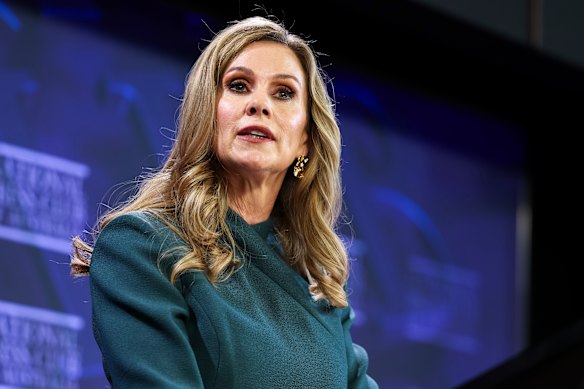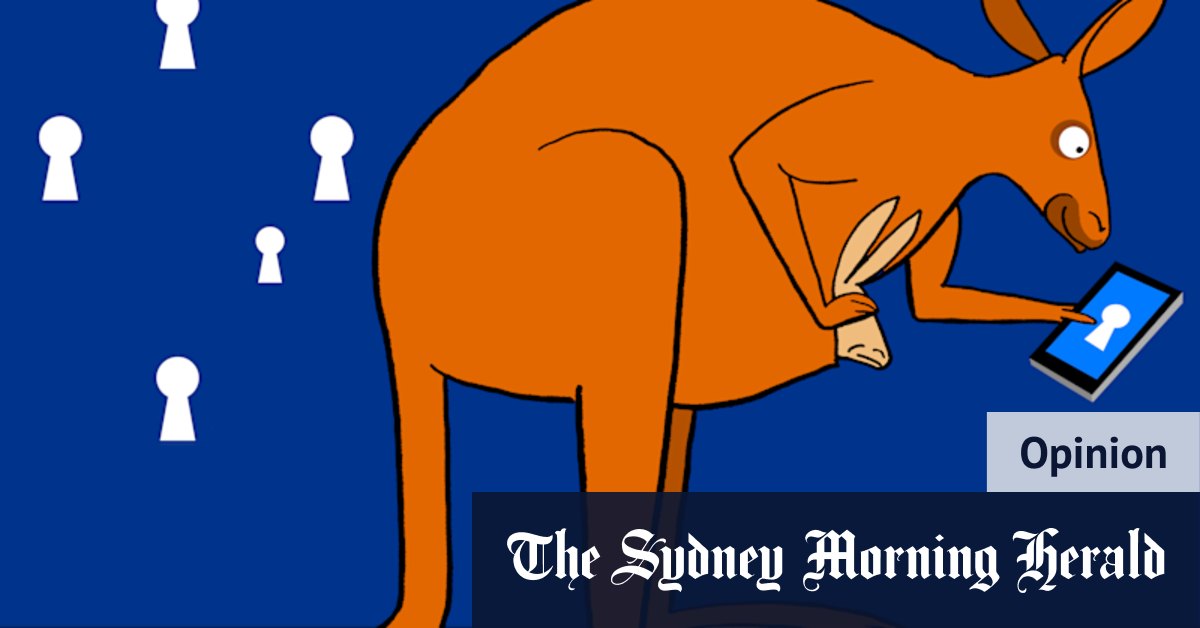Who could fail to be moved? The handful of corporations that profit from the trade, each of which has a market capitalisation of a trillion US dollars or more, of course.
Loading
Communications Minister Anika Wells is exasperated with their inertia. In a series of meetings in Canberra this week with each of the big platforms separately, her frustration was on display.
“The harms being experienced by Australian teenagers online are manifest and evidence-based, and you’ve had 10 years and done nothing,” Wells relates to me by way of illustration. “You have had 12 months’ notice and now we are two months out.” And they’re pleading for exemptions and offering half-measures.
The accounts of under-16s in Australia are to be deactivated by December 10. It will be a seismic event for most Australian teenagers under the age limit. But the half-measures on offer this week have only hardened Wells’ determination. The news, as reported by the Australian Financial Review’s Sam Buckingham-Jones: “Two of the world’s biggest tech companies, Meta and Google, have announced new safety features for teenagers on Instagram and YouTube, less than two months before Australia’s world-first social media ban for people under 16 comes into effect.” These companies intend to apply the changes worldwide.
Wells says that “of course we appreciate the improvements they’ve made this week but to me, it demonstrates that they were entirely capable of making their platforms safer all along; they’re only doing this now because they’re facing our ban. Their changes don’t meet our policy imperative. I am absolutely unyielding on this.”
The changes announced by Meta and Google vindicate the government’s insistence, and the eSafety Commission’s findings, that the age restriction is technologically feasible. This is an important win for Australia’s case.
The only thing lacking is corporate will. The Australian solution will change the incentives for them by applying $50 million fines for systemic failures.
To ignore the looming mountain of evidence at this point would be a failure at least as monumental as the Catholic Church’s wilful refusal to confront its crisis of child sexual abuse. The church was guilty of covering up “repugnant crimes”, said Pope Francis, as were other churches. On Friday, a Vatican commission released a report finding that the church was failing still to support and recompense victims.
One of the earlier witnesses for the prosecution of social media companies was Frances Haugen, the Facebook employee who exposed thousands of pages of the company’s secret, internal “super tragic” research, as she called it.
Among many damning disclosures was that Instagram “harms teenage girls” and just kept doing it, as Haugen said. One internal study found that 13.5 per cent of teen girls said that Instagram made their suicidal thoughts worse, and 17 per cent said it aggravated their eating disorders.
Loading
“They get more and more depressed,” said Haugen. “And it actually makes them use the app more. And so, they end up in this feedback cycle where they hate their bodies more and more.”
And the book The Anxious Generation by social psychologist Jonathan Haidt last year laid out irrefutably the accelerated mental health epidemic created by the corporations. He listed the four major harms of a “phone-based childhood” as social isolation, sleep deprivation, fragmented attention and addiction.
Wells says the ban, and responses to it, will be “fast-moving and won’t be perfect”, but that “it will create cultural change – instead of ‘everyone’s on TikTok so you must be on TikTok’, it’ll be ‘everyone’s off TikTok and finding new ways to interact with each other’, as people did for generations. It’s like the seatbelt law, the ban on under-18s drinking alcohol, it’s where cultural change comes from.”
A brace of European nations, and a swag of US states, are following with a range of experiments and efforts to achieve something similar.
It’s been a long time since Australia pioneered such profoundly important social policy. Together with New Zealand, Australia had an early history of leading the world on democratic innovation. As we should. Few Australians realise that we were the first country in history to vote itself into existence. That happened when the people voted in state-based referendums to endorse the proposal to join together to create the federation we formed in 1901.
Among early path-breaking reforms were the enfranchisement of women. New Zealand was first to allow women the vote, in 1893, and South Australia followed the year after. At the same time, SA became the first jurisdiction to allow women to stand for parliament.
The secret ballot was known worldwide as the “Australian ballot” when Victoria and SA became the first to implement the concept in 1856. These decades were the “Australian spring”.
In recent decades, the Hawke government invented a clever scheme to make sure that no one was denied entry to university because of a lack of money. It was HECS, now HELP. The Gillard government, with the support of the Abbott opposition, introduced the NDIS.
But while these were both world-leading in the specifics of their design, they were iterations of much older ideas for the subsidisation of students and support of the disabled.

eSafety Commissioner Julie Inman Grant: “The harms AI could unleash may be irreversible and much more catastrophic.”Credit: Alex Ellinghausen
On the other hand, decisive regulation of social media is revolutionary, not evolutionary. It’s qualitatively more akin to the enfranchisement of women; this is the enfranchisement of childhood.
The social media corporations haven’t given up. They’ve been busy lobbying the Trump administration to confront Albanese to scrap the age ban. Trump has said in the past that he’ll be very tough on any country that tries to restrict the “freedom” of US platforms.
If the president chooses to challenge the Australian prime minister on this policy in their White House meeting next week, Albanese will not take a backward step. But Trump would be making him a national hero.
This is not the final word, however, in the recovery of civilised treatment of our children. The fast-forming frontier is AI. The eSafety Commissioner, Julie Inman Grant, says: “I’m very concerned that the AI industry is not learning the lessons of the social media era of ‘moving fast and breaking things’. And the harms AI could unleash may be irreversible and much more catastrophic.”
The work of responsible government is never finished.
Peter Hartcher is political editor.
Lifeline 13 11 14

